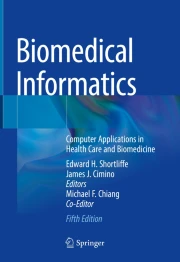
This is a preview of subscription content, log in via an institution to check access.
Hardcover Book EUR 116.04
Price includes VAT (France)Tax calculation will be finalised at checkout
This 5th edition of this essential textbook continues to meet the growing demand of practitioners, researchers, educators, and students for a comprehensive introduction to key topics in biomedical informatics and the underlying scientific issues that sit at the intersection of biomedical science, patient care, public health and information technology (IT). Emphasizing the conceptual basis of the field rather than technical details, it provides the tools for study required for readers to comprehend, assess, and utilize biomedical informatics and health IT. It focuses on practical examples, a guide to additional literature, chapter summaries and a comprehensive glossary with concise definitions of recurring terms for self-study or classroom use.
Biomedical Informatics: Computer Applications in Health Care and Biomedicine reflects the remarkable changes in both computing and health care that continue to occur and the exploding interest in the role that IT must play in carecoordination and the melding of genomics with innovations in clinical practice and treatment. New and heavily revised chapters have been introduced on human-computer interaction, mHealth, personal health informatics and precision medicine, while the structure of the other chapters has undergone extensive revisions to reflect the developments in the area. The organization and philosophy remain unchanged, focusing on the science of information and knowledge management, and the role of computers and communications in modern biomedical research, health and health care.
Edward H. Shortliffe is Chair Emeritus and Adjunct Professor in the Department of Biomedical Informatics at Columbia University's Vagelos College of Physicians and Surgeons. Previously he served as President and CEO of the American Medical Informatics Association. He was Professor of Biomedical Informatics at the University of Texas Health Science Center in Houston and at Arizona State University. A board-certified internist, he was Founding Dean of the University of Arizona College of Medicine – Phoenix and served as Professor of Biomedical Informatics and of Medicine at Columbia University. Before that he was Professor of Medicine and of Computer Science at Stanford University. Honors include his election to membership in the National Academy of Medicine (where he served on the executive council for six years and has chaired the membership committee) and in the American Society for Clinical Investigation. He has also been elected to fellowship in the American College of MedicalInformatics and the American Association for Artificial Intelligence. A Master of the American College of Physicians (ACP), he held a position for six years on that organization’s Board of Regents. He is Editor-in-Chief of the Journal of Biomedical Informatics and has served on the editorial boards for several other biomedical informatics publications. In the early 1980s he was recipient of a research career development award from the National Library of Medicine. In addition, he received the Grace Murray Hopper Award of the Association for Computing Machinery in 1976, the Morris F. Collen Award of the American College of Medical Informatics in 2006, and was a Henry J. Kaiser Family Foundation Faculty Scholar in General Internal Medicine. He has served on the oversight committee for the Division of Engineering and Physical Sciences (National Academy of Sciences), the National Committee for Vital and Health Statistics (NCVHS) and on the President's Information Technology Advisory Committee (PITAC). Dr. Shortliffe has authored over 350 articles and books in the fields of biomedical computing and artificial intelligence.
Dr. James Cimino is a board certified internist who completed a National Library of Medicine informatics fellowship at the Massachusetts General Hospital and Harvard University and then went on to an academic position at Columbia University College of Physicians and Surgeons and the Presbyterian Hospital in New York. He spent 20 years at Columbia, carrying out clinical informatics research, building clinical information systems, teaching medical informatics and medicine, and caring for patients, rising to the rank of full professor in both Biomedical Informatics and Medicine. His principle research areas there included desiderata for controlled terminologies, mobile and Web-based clinical information systems for clinicians and patients, and a context-aware form of clinical decision support called “infobuttons”. In 2008, he moved to the National Institutes of Health, where he was the Chief of the Laboratory for Informatics Development and a Tenured Investigator at the NIH Clinical Center and the National Library of Medicine. His principle project involved the development of the Biomedical Translational Research Information System (BTRIS), an NIH-wide clinical research data resource. In 2015, he left NIH to be the inaugural Director of the Informatics Institute at the University of Alabama at Birmingham. The Institute is charged with improving informatics research, education, and service across the University, supporting the Personalized Medicine Institute, the Center for Genomic Medicine, and the University Health System Foundation, including improvement of and access to electronic health records. He holds the rank of Tenured Professor in Medicine, and is the Chief for the Informatics Section in the Division of General Internal Medicine. He continues to conduct research in clinical informatics and clinical research informatics, he has been director of the NLM's week-long Biomedical Informatics course (currently hosted by Georgia Regents University) for 16 years, and teaches at Columbia University and Georgetown University as an Adjunct Professor. He is an Associate Editor of the Journal of Biomedical Informatics. His honors include Fellowships of the American College of Physicians, the New York Academy of Medicine and the American College of Medical Informatics (Past President), the Priscilla Mayden Award from the University of Utah, the Donald A.B. Lindberg Award for Innovation in Informatics and the President’s Award, both from the American Medical Informatics Association, the Medal of Honor from New York Medical College, the NIH Clinical Center Director’s Award (twice), and induction into the National Academy of Medicine (formerly the Institute of Medicine).